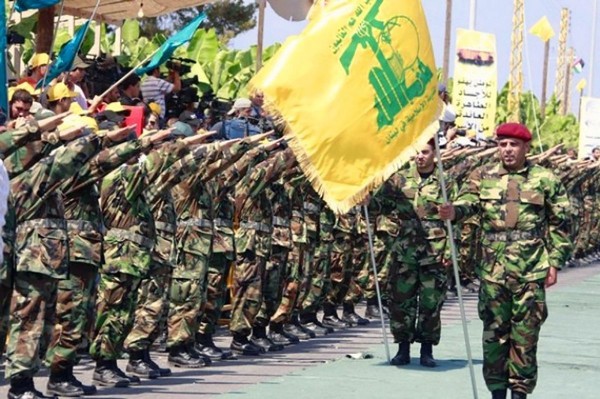 Lawmakers will vote this week on strengthening sanctions against the Iran-backed militia Hezbollah and punishing Iran for its ballistic missile development, amid pressure from the Trump administration to come to a legislative solution related to the 2015 Iran nuclear deal.
Lawmakers will vote this week on strengthening sanctions against the Iran-backed militia Hezbollah and punishing Iran for its ballistic missile development, amid pressure from the Trump administration to come to a legislative solution related to the 2015 Iran nuclear deal.
The congressional moves are aligned with the Trump administration’s vows to crack down on Iran’s non-nuclear malign activities. But an undefined deadline to fix the deal is also looming. Trump said earlier in October that if officials, lawmakers, and European allies cannot agree on a fix to the deal, he would withdraw from it.
Top House Republicans said in turn that they’d work to address the deal’s flaws, but that they’d be taking imminent action on a range of non-nuclear legislation. This includes a trio of measures related to Hezbollah, the Lebanese militia that reportedlyreceives hundreds of millions from Iran.
“As President Trump said last week, the full range of threats Iran poses to the United States and our allies requires a multifaceted approach. It’s not just the flawed Iran nuclear deal,” House Foreign Affairs Committee chairman Ed Royce and House Majority Leader Kevin McCarthy said said in a Friday statement provided to THE WEEKLY STANDARD. “It is the support for terrorist organizations like Hezbollah and murderous regimes like Assad’s, along with continued ballistic missile advancements that must be addressed.”
One of these measures, the Hezbollah International Financing Prevention Amendments Act, strengthens sanctions that disrupt the terror group’s flow of resources. It targets regimes that provide the group with significant material or financial support, in addition to foreign people that help its fundraising or recruiting efforts. The legislation also requires the president to submit a report on Hezbollah members’ or associates’ estimated net worth. A Senate version of the bill passedearlier in October.
Another bill, Sanctioning Hezbollah’s Use of Civilians as Defenseless Shields Act, targets Hezbollah members responsible for the use of civilians as human shields.
A third measure calls on the European Union to designate Hezbollah in its entirety as a terrorist organization. Experts have urged the EU not to separate Hezbollah into a “political wing” and a “military wing,” but to designate the entire militia as a terrorist organization.
A fourth bipartisan bill hits Iran for its ballistic missile program. The Iran Ballistic Missiles and International Sanctions Enforcement Act will impose sanctions against foreign entities that facilitate Iran’s ballistic missile development. It also punishes those that trade conventional weapons with Iran against a U.N. restriction.Trump administration officials have said they want to neutralize Iran’s support for terrorism and counter its ballistic missile development.
Before rolling out a comprehensive Iran strategy in October, the president chose not to certify a condition about the nuclear deal under a 2015 law (INARA). That decision set off a 60-day period during which lawmakers can use a fast track process to reimpose nuclear deal sanctions on Iran.
Instead, though, administration officials have urged lawmakers to come to a legislative solution that addresses the deal’s flaws.
“What he would like Congress to do is, instead of having legislation that has us reporting to each other, let’s have some legislation that can address some of these flaws,” National security adviser H.R. McMaster said at an event earlier in October. “That can, at least from a unilateral perspective, lay out a marker on where we think this should evolve. And then work with our allies and partners to rigorously enforce, get IAEA capacity up.”
Democrats who voted against the deal have not publicly thrown support behind a legislative fix, instead focusing on non-nuclear sanctions.
“The worst things Iran is doing now are not within the nuclear deal but outside of it,” said Senate Minority Leader Chuck Schumer.
Republicans have also stressed the importance of getting tougher on Iran’s support for terrorism. But they differ on whether Trump should fix, exit, or rigorously enforce the deal.
WEEKLY STANDARD

Leave a Reply
You must be logged in to post a comment.